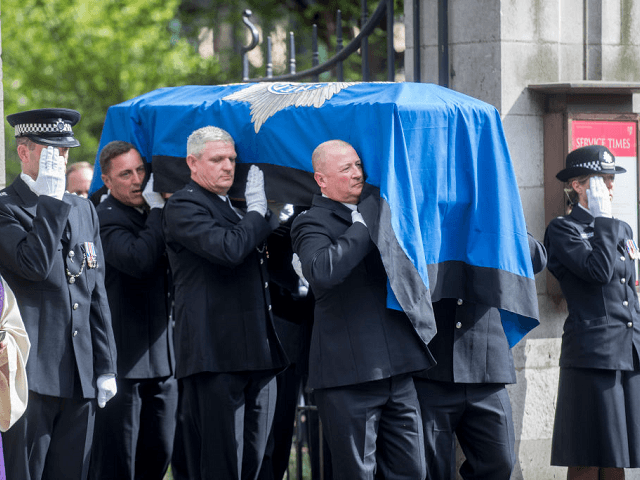The brutal killing of Police Constable Keith Palmer in a terror attack at the Palace of Westminster in March 2017 could have been prevented had it not been for the “shortcomings” of the Metropolitan Police’s security operation, the Coroner has concluded.
The comments come after a three-week inquest into the deaths of five victims of Muslim convert extremist Khalid Masood, a devotee of the Islamic State, who used a hired car to run down pedestrians on Westminster Bridge and a knife to stab PC Palmer to death.
The Coroner said in his conclusion, in remarks reported by The Times newspaper, that: “Due to shortcomings in the security system at New Palace Yard . . . the armed officers were not aware of a requirement to remain in close proximity to the gates. Had they been stationed there it is possible that they may have been able to prevent PC Palmer suffering fatal injuries.”
Violent Since Childhood, Westminster Terror Attacker Started Reading Quran in Prison Inquest Hears https://t.co/Conicl8WPy
— Breitbart London (@BreitbartLondon) September 19, 2018
While armed officers had been present at the Palace at the time of the attack, they were at the other end of the estate on a roving patrol, and were unable to react in time to the 83-second attack before the unarmed PC Palmer was held down and fatally repeatedly stabbed in the head and neck. The firearms officer’s patrol had left the Carriage Gate, which Palmer was standing by, unguarded by an armed officer for almost an hour.
The inquest had been told that senior officers had encouraged the armed officers on duty to not “linger” at Carriage Gates and to keep patrolling, and the force has been accused of scapegoating that decision on the junior firearms officers who were on patrol that day for carrying out their orders.
Perpetrator Masood was shot dead by a political protection officer who happened by chance to be nearby.
Islamic State Supporters Celebrate ‘Blessed’ Westminster Terror Attack https://t.co/lmelEeTEpn pic.twitter.com/R21SWPYuIP
— Breitbart London (@BreitbartLondon) March 23, 2017
The paper also reports the statement of Palmer’s widow, Michelle, who said of the death of her husband: “How could Keith have been left alone, unarmed, guarding an open gate at one of the most iconic buildings in the world and one of the country’s top terrorist targets? He was left at a vulnerable location, with no protection, to die… [the Metropolitan Police] let Keith down by failing to protect him and let us down by failing to investigate his death properly.”
Besides the death of PC Palmer, the inquest heard of the deaths of his fellow victims. United States citizen Kurt Cochran, 54, was a tourist in London and had been in the city less than three hours when he died. Realising Masood’s car was speeding towards him, he pushed his wife out of the way and was struck — the force of the collision threw him off the side of the bridge and onto an area of stone paving below, where he landed head-first.
Leslie Rhodes, 74, a retired window cleaner, was on his way to a hospital appointment when he was struck by Masood. He was thrown into the road by the impact and then driven over, being dragged under the car. Despite the work of paramedics, Rhodes died of his injuries later that day.
Ayesha Frade, 44, was on her way to pick her children up from school when she was “killed instantaneously” upon being struck by Masood from behind as he mounted the pavement. During the inquest, it was revealed that passers-by stopped to take pictures of her body immediately after the attack rather than try to help or resuscitate Frade, a fact the coroner called “distressing”.
Romanian citizen Andreea Cristea, 31, was thrown ten feet into the air and over the parapet of the bridge in the River Thames by Masood’s car. She was eventually pulled out of the river alive by a Fire Brigade boat but had a head injury, had lost a lot of blood, and was hypothermic. She later died. During the attack, 49 other people were injured.

COMMENTS
Please let us know if you're having issues with commenting.